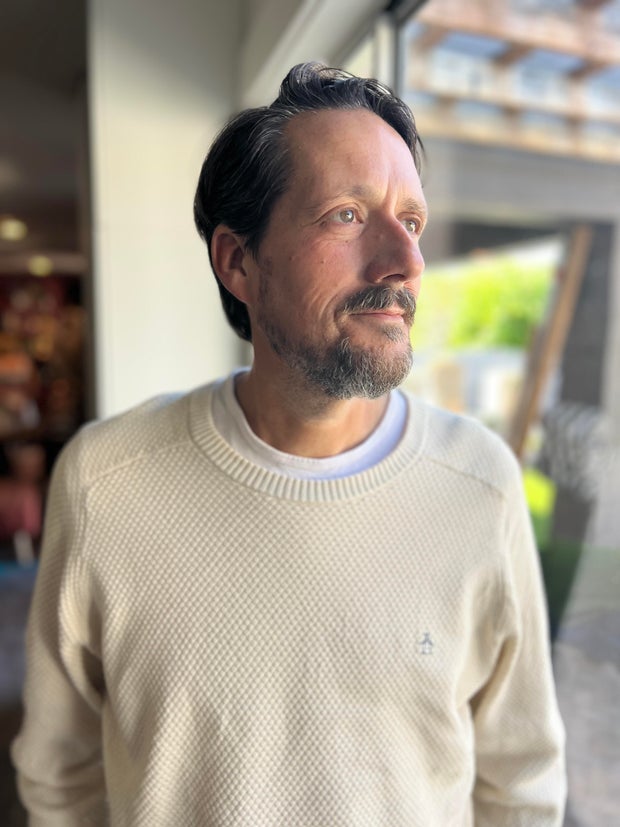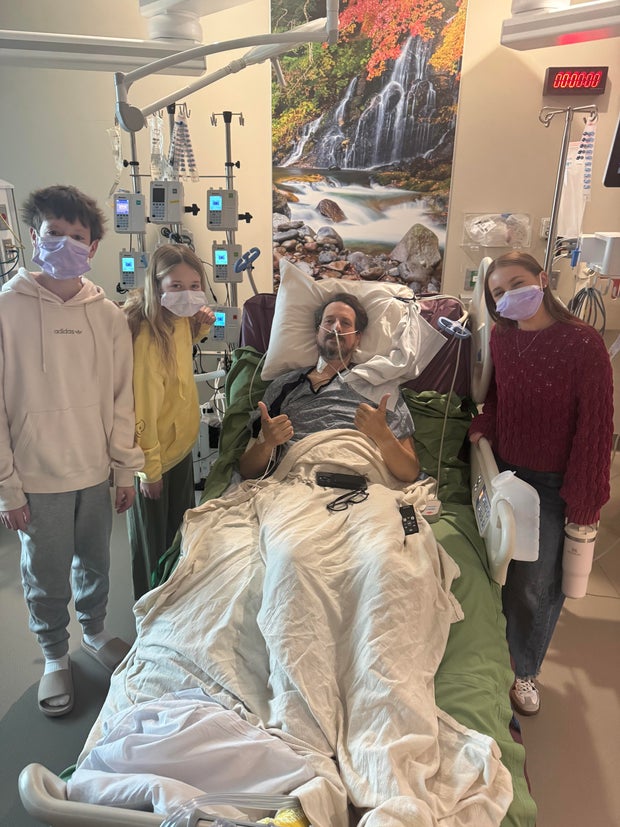Curtis Jackson was feeling fit and healthy in late 2020 when he decided to update his life insurance policy: He was in better shape than he'd been in a while, but he wanted to make sure his wife and three kids were taken care of if anything happened to him.
Jackson, now 46, underwent an intensive physical, and everything seemed to be going well until he received a strange phone call. The call was focused on a questionnaire he had filled out. Jackson had truthfully marked that he did not drink alcohol. But his liver numbers were those of "a functioning alcoholic," he was told.
It set off alarm bells. Jackson went to his primary care physician for another round of bloodwork. That doctor thought he had a problem with his gallbladder. Jackson went to have his gallbladder removed. During that operation, doctors found he had an unusual condition called primary sclerosing cholangitis, or PSC.
The chronic, progressive disease affects the liver and inflames the bile ducts, causing liver damage. Patients eventually need a liver transplant. There's also a small but real chance of a deadly diagnosis: a dangerous cancer called cholangiocarcinoma.
Early treatment and diagnosis can make a difference, so Jackson started undergoing two MRIs a year at the Mayo Clinic in Arizona to make sure he was cancer-free. He also had a regular test to check the progress of his PSC. In October 2024, Jackson had a nerve-wracking appointment where the technician scoping him seemed "very concerned." He felt healthy, but was worried by the appointment.
"She didn't say that it was cancer, but she was hinting towards it," Jackson said.
 Curtis Jackson at home in April 2025.
Mayo Clinic
Curtis Jackson at home in April 2025.
Mayo Clinic
Three weeks later, Jackson and his wife received the news he had been dreading: The tests had diagnosed him with the deadly cancer. He would need to undergo intensive treatment to try to fight the illness. It felt like a repeat of when he had had the initial PSC diagnosis.
"I was feeling fine ... and both times netted a result of something pretty serious," Jackson said.
What is cholangiocarcinoma?
Cholangiocarcinoma, or bile duct cancer, is considered a silent killer, according to Dr. Tanios Bekaii-Saab, the chairman of the division of hematology and medical oncology at the Mayo Clinic in Phoenix, Arizona. Bekaii-Saab was Jackson's oncologist. It tends to spread to other organs before symptoms appear, so most patients are diagnosed "too late to cure," Bekaii-Saab said.
About 20% of people with PSC are diagnosed with cholangiocarcinoma, said Dr. Aqel Bashar, the director of the Mayo Clinic's Transplant Center in Phoenix, Arizona, who also treated Jackson. It's a rare disease, affecting about 1 in 100,000 people in the U.S., Bashar said. Not all cases are associated with PCS. Like many other cancers, it is on the rise, Bekaii-Saab said, with diagnoses of cholangiocarcinoma increasing more than 50% in the past decade. Fewer than 10% of the people diagnosed with cholangiocarcinoma live more than five years, Bashar said.
The best way to treat cholangiocarcinoma is with a liver transplant, Bekaii-Saab said. But it can only be done if the disease is caught early, before the cancer spreads. Many cholangiocarcinoma patients are not eligible for a liver transplant.
Thankfully, Jackson's case was caught early. He underwent three weeks of chemotherapy and radiation to kill as many cancer cells as possible.
"Basically, I lived at Mayo Clinic. I would literally do work out of the parking lot, and then go and do radiation," Jackson said.
During treatment, he lost about 30 pounds. But despite the odds, he remained optimistic that everything would work out. He even encouraged his wife to start a long-anticipated kitchen renovation. In the middle of the process, the family was told a liver was available.
On March 6, he was wheeled into surgery.
 The Jackson family and their dog Lucy at home in April 2025. From left: Stetson Jackson, Gwyn Jackson, Rooney Jackson, Curtis Jackson and Kim Jackson.
Mayo Clinic
The Jackson family and their dog Lucy at home in April 2025. From left: Stetson Jackson, Gwyn Jackson, Rooney Jackson, Curtis Jackson and Kim Jackson.
Mayo Clinic
Surgery and recovery
The surgery took about four hours. Six days later, Jackson was released from the hospital. Testing showed that he was cancer-free. For the next year, he will undergo weekly blood tests and have monthly check-ups. He will need close monitoring for the rest of his life, Bashar said, since his transplant needs to be monitored and doctors need to make sure his cholangiocarcinoma does not return.
For now, Jackson is trying to focus on his home and family, he said. His routine is "pretty close to normal," though he still can't lift more than 10 pounds, and climbing stairs can be draining. He gained back much of the weight he lost in treatment, and his energy levels are close to where they were before the cancer diagnosis.
"Things are definitely getting back to normal, which is really exciting. I wasn't expecting that so fast," Jackson said. "We might call it either lucky, or blessed, or whatever. I am just so thankful that I was able to bounce back so quickly."
 Curtis Jackson and his children hours after his transplant surgery.
Jackson family
Curtis Jackson and his children hours after his transplant surgery.
Jackson family
The Jacksons are putting the finishing touches on the kitchen renovation, and planning to travel to North Carolina for vacation this summer. He also wants to plan family trips outside the country once he needs less frequent check-ups. His other priority is turning his story into something that can help others, and advocating for organ transplant and donation.
"I have a new passion now," Jackson said. "I'm here because of these things. I would like to help this going forward and make sure people are learning the importance of donation."
Kerry Breen is a news editor at CBSNews.com. A graduate of New York University's Arthur L. Carter School of Journalism, she previously worked at NBC News' TODAY Digital. She covers current events, breaking news and issues including substance use.








 English (US) ·
English (US) ·